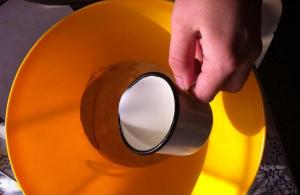We all tend to want and dream. This is one level. It’s a completely different level to achieve. Achieving is more difficult than dreaming or wanting: what is needed here is not images, to achieve it one needs simple and understandable actions, strung together with a clear and clear goal. But how to connect two poles: desires and results? How is a dream different from a goal? And why dreams and goals Not interchangeable, if essentially they are about the same thing?
Let's look at an example.
Let’s say that you dream of conquering peak “A” ( here you can substitute your own dreams and desires), sleep and see your own ascent. Your dream lives in some abstract illusory fantasy world and has no connection to reality yet. This is the first The difference between a dream and a goal is that a dream is illusory.
To “land” a dream, you need a goal. The goal is a tool. Imagine that you pick up a map or a plan of the area, or maybe draw a diagram on paper in which you designate your desired peak “A” and connect it with your current location with a red line. It turns out a completely understandable and tangible direction of movement - this is yours. Now the dream of conquering peak “A” is not abstract, but is tied with a red line to your current location on the map, and you can see the path that has to be taken to reach the result. Your map (plan or diagram) of the area will help you navigate your way, filter out the unnecessary, choose the optimal road to the result, and make a preference on how best to go.
The goal is about the meaningfulness of the choice, about the logic in the actions and deeds performed. A goal is about what decision to make in order to achieve a result faster. That's why a goal, unlike a dream, has a time to achieve it, and fantasies and desires are not listed on calendars. Time is always deliberately allocated to achieve a goal. And you achievement process, characteristic of goals, determined by actions or steps that gradually lead to a result. This is another difference between a goal and a dream.
Dream– is strong motivational mechanism. A dream forces you to rethink priorities and act. It encourages you to work without sleep or rest, to put aside other desires and needs. And the goal helps you choose which actions will be optimal, and what should be abandoned to achieve the result, what resources are necessary, and what interferes with the path.
It also happens that we choose the wrong route and realize it halfway, but inspired by a dream, we draw a new one and go again. We didn’t manage to conquer the peak from the northern slope (no one promised that it would be easy), it’s worth trying the southern one.
The scale of the goals also differs. And there's nothing wrong with that. The achievement skill is practiced first on small goals. Small, easily achievable goals over time imperceptibly add up to a global result, consolidating the ability to achieve and giving confidence. And then goals appear on such a scale that it’s scary to take on, so that balancing on the line between “scary” and “interesting” you feel a taste for life. After all, happiness is a process.
The ability to set and achieve goals over time becomes a way of life. If you don’t exercise, a habit is formed, of dreaming and not achieving, of living life in illusions. It's easier to dream than to do. It's easier to make excuses than to make mistakes. Therefore, we stop at the dream, preferring not to do it, which means we continue to fantasize about the result rather than achieve it.
Let's sum it up
Everything in the world has a mental basis - dreams and desires arise in our minds and then come true physically. A goal is a tool that allows you to specify your dream and choose the direction to achieve what you want. The dream is abstract, the goal is real. A goal is a direction towards a result, designated in time and programmed with real, regular actions that ensure the fulfillment of a dream.
Elena Vetshtein.
P.S. For those who want to work through their goals and learn to achieve the desired results, proprietary programs and materials have been created. Here you can choose a training model that suits you to manage yourself and your life results.
TO LEARN MORE
How is a dream different from a goal?
We all want something, strive for something. But our aspirations do not always come true. What's the matter, why can't we realize our dreams? Perhaps we set goals incorrectly or simply do not know how to set them? And in general, are there any differences between dreams and goals, because some consider these concepts to be identical? Let's try to understand these issues.
What is a dream and goal
Dream- an image of something very strongly desired, coveted, alluring that exists in one’s thoughts.
Target- the desired result, to achieve which a specific action plan has been developed with a specific time frame for the implementation of the plan.
Comparison of dreams and goals
What is the difference between a dream and a goal?
A dream is something ephemeral, illusory, airy, ideal, abstract. She inspires us. This is just the first milestone on a long journey. The dream pushes us to take a step, but whether we will take it is unknown. Very often dreams never come true. The goal gives certainty; it becomes our guide on the road of life. The function of a dream is to inspire, because a dream is directly related to the world of feelings and emotions. A goal is unthinkable without specific actions.
By dreaming, we can shift responsibility for the fulfillment of our aspirations to other people or higher powers. Everything turns out as if “by itself”, in a wonderful, magical way, without any effort. We have to achieve goals ourselves, personally, without relying on others. Although receiving outside help is not excluded, the responsibility for achieving the goal lies with us. The dream is usually performed, but here are our goals we reach.
Often the dream is very broad, vague, blurry, and has no clear boundaries. The dream is not limited by anything, because it lives only in our imagination. The goal forces us to set the necessary tasks and outline a plan of action. It is best if it is written down on paper and has a certain time frame for completion - by checking what is planned, it is easier to move in the right direction. Purpose is inherently clear. A goal is something real, something we can achieve, something we are moving towards systematically and systematically.
Moving towards a goal, a person activates all his vital resources, gathering his will and concentrating his attention. A goal requires some tension, while in dreams we are relaxed (it is impossible to dream in tension). When striving towards a goal, we have to leave the comfort zone in which we can stay, basking in dreams, and move forward. The goal requires activity; the dream itself is initially passive.
The difference between a dream and a goal
1. A dream is something ephemeral, illusory, ideal, abstract. A goal is something real, concrete, defined, formulated, and supported by resources. When we dream, we stand still; as soon as a clear goal appears, we begin to move towards it. The goal motivates us, we know why we are going to it.
2. The dream comes true as if by itself, a specific person comes to the goal, he achieves it. In a dream, we shift responsibility to others; on the way to the goal, we take responsibility on ourselves.
3. The dream is usually vague and broad. The goal should have a clear time frame and, preferably, be written down on paper.
4. The goal forces us to leave our comfort zone, change the situation, give up something familiar and familiar and go to the desired result, while, dreaming, we remain alone: nothing changes around us, daydreaming does not require physical exertion and mental strength. The goal is active, the dream is passive.
Everyone dreams, but few people really know what a dream is and how it differs from a goal. But in fact, this is a very important question, because human actions depend on the correct definition of these concepts. The difference between them is key.
Hello. My name is Andrey, I'm 22 years old. For a very long time I confused my dream and my goal. No, of course, I knew in theory how they differed, but this did not affect my actions in any way. That is, I knew the main differences between these concepts, but did not understand the fundamental difference.
After I understood the difference between a dream and a goal, things started to improve for me. Not because I knew Zen or some other truth. I just started doing something. Actually, this is the main difference between these concepts.
The main differences between a dream and a goal
Very often people confuse dreams and goals, reducing them to one concept. This approach has a significant drawback: the key difference is lost, which negatively affects a person’s life. Of course, a dream, a goal - the concepts are similar, so first we will give definitions of each concept in order to differentiate them in the reader’s mind.
A dream is a desired image of future reality. Moreover, it does not have to be specific. This is not required at all. An example of a dream is “I want to be a rich man so that I can fly every month to the islands and drink 20-year-old wine there, and sleep in an expensive hotel with gold trim in the rooms.”
Of course, there are already specifics here. But this is only at first glance. In fact, a person does not need to fly to the islands every month and drink 20-year-old wine. It becomes a goal only when a person takes certain steps to achieve this result. Based on this, we will derive the main signs indicating how a goal differs from a dream:
- Specificity. A person knows exactly what he wants, how he is going to achieve it, or is at least ready to learn the means of achieving the desired result.
- Having purposeful actions. A person may not know what to do, but in this case he will in every possible way look for ways to find out this information.
- Having a plan. In any case, what distinguishes a dream from a goal is the presence of a plan. This is not necessarily a sequence of actions laid out on paper.
- Feasibility. The dream may not be feasible, but the goal is a priori feasible. That is why it needs to be supported by a plan, because a person must be able to give himself an answer to the question: “how will I achieve this.” It is the prescribing of real actions (even if erroneous at the first stage) that allows you to translate a dream into a goal.
- A dream is the basis of a goal. When setting it up, a person himself starts from how he sees his ideal life.
To summarize, we can say this: a dream is an ideal, blurry image of the desired reality, which through concretization and planning can be translated into a goal.

The difference between a dream and a wish
At the heart of a dream is the concept of “I want,” as in the case of desire. What are the main differences here then? Approaches to interpreting the differences differ, but in general, the following characteristics distinguish a dream from a desire:
- Focus on the future. The desire is aimed more at the current moment or the near future. For example, “I want candy”, “I want to relax”.
- A dream is a product of our thinking and imagination, while a desire is purely emotional in nature.
- A dream may be one that is difficult or even impossible to achieve, while the desire is feasible. In the case of the same candies, the desire is “I want it now,” and the dream is “I want to eat tons of candy and not get diabetes.” Sometimes a dream seems so impossible that its coming true seems like a real miracle. At the same time, it is important that in objective reality many of our dreams are completely realizable, it just seems to us that this is something unrealistic.
- While a dream is the zero stage of action, desire is already the first. Very often it is precisely this that precedes the latter, although not always. There may be such a thing as a struggle of motives, when two opposing desires compete with each other. Essentially, this is an internal conflict, the result of which is one action or another. Example: go shopping or save money.
Main differences between desire and goal
Desire has a lesser degree of awareness, but greater than banal organic desire. A goal is an exclusively volitional act. A person makes a clear, conscious decision to achieve the desired result. Here the difference is approximately the same as in comparison with a dream: desire is based on the emotional component of a person, and the goal is based on the mind. What do they have in common? Both desire and goal can become real incentives for activity.

Difference between fantasy and dream
Fantasy and dream: what is the difference between these concepts? Let's answer this question in more detail. Both phenomena are products of human imagination. However, there is a fundamental difference between these concepts. Fantasy is when a person imagines something completely divorced from reality. For example, if we dream of buying our own dragon for one ruble, and a living one, then this is a fantasy.
The dream is more mundane, although it is not a fact that it is feasible. The probability of achieving it may be negligible, but it exists, while the probability of realizing the fantasy is zero.
In fairness, we note that no one can know 100% whether this or that goal is achievable. Once upon a time, a person fantasized about being able to fly. And then it seemed unreal. But after some time, a hot air balloon was invented, and then an airplane.
Or once upon a time, various writers fantasized about the fact that with a couple of shots you could destroy all of humanity. But now it is a reality. So everything is relative. Maybe one day we will be able to create a dragon, although now such a possibility seems like the ravings of a madman.

Instructions for turning dreams into goals
The first requirement is that the goal must meet SMART criteria. This, of course, is not necessary; it can be specified in another way. It’s just that this abbreviation has already become a classic, and we will describe it in more detail. When setting a goal, you need to pay attention to the following criteria:
- Specificity. This paragraph describes in detail the desired result.
- Measurability. The goal does not have to be quantitative, that is, formulated in the form “earn 10 thousand dollars in a month.” In this case, we need to clearly state the criteria by which we can determine that the goal has been achieved. It’s interesting that a lot of people dream of something, but they can’t clearly say how they will understand that they got what they wanted. Hence the saying: “Beware of your wishes - they sometimes come true.”
- Reachability. At this point, you must clearly understand how you will achieve your goal. If you want to get a brilliant result, it is wise to take on a simpler problem that you know the solution to. You can always take a small achievable aspect of an elusive dream.
- Relevance. The goal must be achieved by the time it is still needed, and also be relevant at the moment.
- Limited time. It is necessary to clearly define the deadline by which the task must be completed.
In general, you need to be flexible. There are goals whose deadlines are difficult to predict, so you can violate the third point in this way. But all other components must be met so that you can say that you have a goal.
conclusions
So, a goal is an achievable plan for obtaining the desired result, a dream is an image of the desired result in the future, which can be quite vague. In turn, desire is a direct momentary stimulus for action here and now or in the near future (both as soon as and immediately).
You are very well done for striving for the best. Be sure to check out other articles on this topic that can be found on our website. Remember that actions are the most important component of the goal. If you lie on the stove and dream, nothing good will happen, only bad things. If you're afraid, it's okay. Any complex task can be broken down into several simpler ones and small feasible actions can be performed.
Hello, dear friends!!!
For as long as I can remember, I have always dreamed of it and still continue to do it! What’s surprising is that dreams are something pleasant, beautiful, distant and... not achievable??!!! So what is this - a Dream?
According to Dahl: DREAM something, or about something, play with the imagination, indulge in the play of thoughts, imagine, think, imagine something that is not in the present; It’s nice to think, to think about the impossible. A dream in general is any picture of the imagination and play of thought; an empty, unrealizable fiction; ghost, vision.
When we start to dream, we have some kind of desire, sometimes strong, then the desire takes shape in a dream, we constantly return to it, the desire does not give us peace. Why often does a dream remain unfulfilled? Because we didn't make the dream a goal. And when we finally decide to set a goal, even if it is difficult to achieve, our dreams begin to come true.
According to Dahl: GOAL - desire, aspiration, intention, what someone is trying to achieve. They do nothing without a goal. Goal, beginning or root of the matter, motivation; behind it comes the means, the method, and the end, the goal, the achievement of it accomplishes the work. To strive for something, to want to achieve something, to intend; mark yourself where, place, rank, etc.
If a dream and a goal are an image and idea of something desired, then what is the difference?
A dream is something worth living for, something that realizes our Purpose. So why should we live on planet Earth? I think you will agree that there are several components for which you should live!
Happy family, clan, people.
Realization of oneself in any activity.
Creating works of creativity, beauty, power. Monuments, temples, buildings, etc.
Traveling with the aim of exploring the world, exchanging cultural and spiritual values, visiting historical monuments, etc.
Charity is helping people in need.
Transferring knowledge and experience to others (creating your own school, center, club, methodology).
Or maybe something else?
The more Dreams or ways a person has to realize his Purpose, the more interesting and joyful his life will be. are starting to come true.
Question: Do you have a dream, an idea, a thought about how you would like to live ideally, with whom, and where, what to do, how to make money? Very often, what we actually formulate as a Dream is Conditions for realizing the Dream.
Money, strength, knowledge are only tools, goals. Some use them in criminal areas, some to show off to others, and some to make life better for themselves and others. What do you spend it on?
Goals are our desires, which are stages (steps) or tools for achieving a dream, something that will make our life better, more comfortable, which will speed up the realization of the Dream. How to set goals correctly to make your dream come true?







